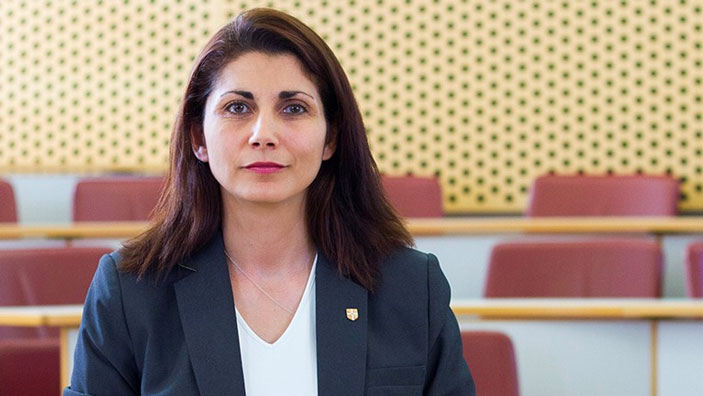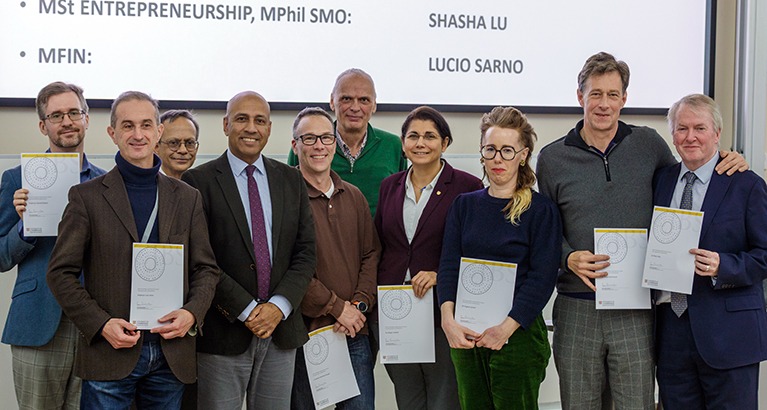
A study on temporary marketing organisations co-authored by Allègre Hadida of Cambridge Judge Business School has been named winner of the prestigious 2024 Louis W. Stern Award of the American Marketing Association for research in the field of marketing channels and distribution.
The research by Allègre focuses on how marketing activity is often conducted within temporary organisations set up to handle specific tasks within a given timeframe – and this can help improve organisational agility and lead to more rapid commercialisation of new products.
Examples of such temporary arrangements include outside laboratories and research centres that handle product development for pharmaceutical firms, temporary entities to handle new client projects for advertising agencies, and product development in the commercial aviation industry that require specific expertise.
Why challenges of temporary organisations need careful attention
The paper also highlights how temporary arrangements pose their own challenges. Described by some as the “organisational analog of a one-night stand”, the paper says, these temporary organisations are known for a high variance in outcome that pose risks if not managed properly.
“Some temporary organisations create products, services, or experiences that impress industry experts and delight customers. Others, in contrast, exceed their budgets, fall short of expectations, and are soon forgotten”, the winning paper says. “Such organisations are uniquely suited to promoting various marketing outcomes but are not well understood. From a practical standpoint, their inherent characteristics create organisational challenges that, if not appropriately managed, can compromise performance”.
The paper published in the Journal of Marketing in March 2019 – entitled ‘The temporary marketing organization’ – was co-authored by Allègre Hadida, Associate Professor in Strategy at Cambridge Judge, Jan Heide of the University of Wisconsin-Madison, who is a Research Fellow in Marketing at Cambridge Judge, and Simon Bell of the University of Melbourne in Australia. The award will be formally presented at the American Marketing Association’s annual summer luncheon in Boston, Massachusetts, in August.
Award aims to encourage more research on channel distribution
The Louis W. Stern Award, established in 1999, is named after Louis W. Stern, an expert on marketing channels who is the John D. Gray Distinguished Professor Emeritus of Marketing at the Kellogg School of Management of Northwestern University. His career has included teaching at several other leading US business schools as well as serving as a principal economist for the National Commission on Food Marketing in Washington.
The award recognises “the outstanding article in a widely recognised and highly respected refereed journal that has made a significant contribution to the literature on marketing and channels of distribution”, and is “intended to encourage the academic community to continue to produce high quality academic research” in this field. Articles published between 3 and 8 years ago are eligible for the award.
The Louis W. Stern award is decided by a 3-judge panel drawn from experts in the field and members of the American Marketing Association’s Interorganizational Special Interest Group (IOSIG). Criteria include:
- quality of the article’s contribution to theory and practice
- originality of the article
- technical competence in the execution of the research
- impact on the field of channels of distribution
“We are delighted to have won the Louis W. Stern Award, and immensely grateful to the 2024 Stern Award committee and the members of the IOSIG for recognising our work in such a meaningful, generous, and encouraging way”, said Allègre, who is also a Fellow and Director of Studies at Magdalene College, University of Cambridge.
“Our article offers a novel theoretical framework to better understand the temporary organisation, research propositions to expand future research, and practical suggestions for managers. We are thrilled that our research contributes to the marketing, strategy, and general management conversation on this important and growing organisational form”.
Research identifies 3 types of temporary marketing setups
The paper identifies 3 types of temporary marketing organisations
- stand-alone (often used in the advertising industry)
- hybrid (involving people who have previously worked together on some projects, which is common in the film industry)
- fully embedded (sitting within the permanent organisation).
The research provides a conceptual operational framework that links those 3 temporary types to the novelty of the task, duration of the project, and diversity of the team involved. For example, a standalone structure is more likely to fit a novel task, while time-limited projects may benefit from a hybrid approach because decisions can be made faster.
Yet these benefits contain drawbacks as well, including the lack of built-in enforcement mechanisms that exist when critical tasks are handled in-house. “A temporary organisation poses unique challenges in this regard, because of the need to provide incentives in the presence of novel tasks and ambiguity with regard to individual agent contributions”, the study says. “For instance, temporary organisations developing new products in the commercial aircraft industry often use explicit revenue-sharing contracts which are designed to align the parties’ interests”.
Award winning study offers practical guidelines to companies
There are numerous practical applications of the winning paper in this age of shrinking marketing departments and a trend toward shorter average tenure of chief marketing officers.
“We consider the development of guidelines to help firms determine the most appropriate selection and enforcement mechanisms depending on the form of temporary marketing organisation to be the single most important managerial implication deriving from our framework”, the authors say.
“Taken together, these diagnostics of embeddedness and task novelty, duration, and team heterogeneity can guide the design of temporary marketing organisations with the explicit goal of ensuring matches that promote sought-after marketing outcomes, including output creativity and decision-making speed.
“We suggest building a playbook to assist marketers in using temporary organisations to best effect,” the paper says, although “some degree of managerial judgement will be necessary to determine which project feature will dominate the choice of temporary organisation form.”
Other awards and nominations for Allègre Hadida
Allègre’s research often focuses on film, music and other creative industries, and in 2022 Allegre won the Mallen Award for Published Scholarly Contributions to Motion Picture Industry Studies.
She is a recipient of the 2018 University of Cambridge Pilkington Prize for Excellence in Teaching and of the 2022 Excellence in Teaching Award at Cambridge Judge, and was cited in the award announcement as “an engaging, inspiring and energetic teacher” who “dedicates great attention to connecting to individual contexts”.
‘The Temporary Marketing Organization’ paper had previously been a finalist for 2 other top awards, the 2019 Shelby D. Hunt/Harold H. Maynard Award for the best Journal of Marketing article on marketing theory, and the Sheth Foundation/Journal of Marketing Award for the best article published in the Journal of Marketing that has made long-term contributions to the field of marketing.
Featured research
Hadida, A.L., Heide, J.B. and Bell, S. (2019) “The temporary marketing organization.” Journal of Marketing, 83(2): 1-18 (DOI: 10.1177/0022242918813119)
Related content
The Louis W. Stern Award will be presented at the American Marketing Association’s annual summer luncheon in Boston, Massachusetts, in August 2024.





